07 Mar 18 | Campaigns -- Featured, Statements
[vc_row][vc_column][vc_single_image image=”96393″ img_size=”full” alignment=”center”][vc_column_text]An Equatorial Guinean court on March 7, 2018 released an artist imprisoned on dubious charges for nearly six months, 17 human rights groups said today. The prosecution dropped all charges against Ramón Esono Ebalé, a cartoonist whose work is often critical of the government, at his February 27 trial after the police officer who had accused him of counterfeiting $1,800 of local currency admitted making the accusation based on orders from his superiors.
“It is a huge relief that the prosecution dropped its charges against Ramon, but they should never have been pressed in the first place,” said Salil Tripathi, chair of PEN International’s Writers-in-Prison Committee. “We urge the authorities to guarantee his safe return to his family, allow him to continue creating his hard-hitting cartoons, and ensure that Equatorial Guinea respects the right to freedom of expression.”
The global #FreeNseRamon coalition, consisting of hundreds of artists, activists, and organizations devoted to protecting artistic freedom, freedom of expression and other human rights, carried out a campaign to direct international attention to his situation.
“Ramon’s release from prison is a testament of the power of collective work of hundreds of artists, concerned citizens, and NGOs” said Tutu Alicante, director of EG Justice, which promotes human rights in Equatorial Guinea. “But we must not forget that dozens of government opponents who are not as fortunate fill Equatorial Guinea’s jails; thus, the fight against human rights violations and impunity must continue.”
[/vc_column_text][/vc_column][/vc_row][vc_row][vc_column width=”1/4″][vc_icon icon_fontawesome=”fa fa-times” color=”black” background_style=”rounded” size=”xl” align=”right”][/vc_column][vc_column width=”3/4″][vc_column_text]
“Index on Censorship welcomes the news that Ramon has finally been released, after being acquitted of all charges. It took too long, and he should never have been jailed in the first place.” — Joy Hyvarinen head of advocacy
[/vc_column_text][/vc_column][/vc_row][vc_row][vc_column][vc_column_text]Esono Ebalé, who lives outside of his native Equatorial Guinea, was arrested on September 16, 2017, while visiting the country to request a new passport. Police interrogated him about drawings critical of the government, said two Spanish friends who were arrested and interrogated alongside him and were later released.
But a news report broadcast on a government-owned television channel a few days after the arrest claimed that police had found 1 million Central African francs in the car Esono Ebalé was driving. On December 7, he was formally accused of counterfeiting. The charge sheet alleged that a police officer, acting on a tip, had asked him to exchange large bills and received counterfeit notes in return.
“Equatorial Guinea’s government has a long record of harassing and persecuting its critics,” said Mausi Segun, Africa director at Human Rights Watch. “Ramon’s release is an important victory against repression.”
At the trial on February 27 in Malabo, Equatorial Guinea’s capital, it became clear that the police officer who had made the accusations had no personal knowledge of Esono Ebalé’s involvement in the alleged crime, according to his lawyer and another person present at the trial. After offering details that conflicted with the official account, the officer admitted that he had acted on orders of his superiors, they said. The prosecution then withdrew the charges.
“We are delighted that Ramón was acquitted and is finally free,” said Angela Quintal, Africa Program Coordinator, Committee to Protect Journalists. “The fact that the state’s main witness recanted, underscores the point that authorities manufactured the charges in the first place. Ramon should never have spent a single day behind bars and we trust that he will not be subjected to any further reprisal.”
The human rights groups are Arterial Network, Association of American Editorial Cartoonists, Asociación Profesional de Ilustradores de Madrid, Cartoonists Rights Network International, Cartooning for Peace, Committee to Protect Journalists, Caoilfhionn Gallagher QC, Jonathan Price and Paul Mason, Doughty Street Chambers, UK, EG Justice, FIDH, within the framework of the Observatory for the Protection of Human Rights Defenders, Freemuse, Human Rights Watch, Index on Censorship, PEN America, PEN International, Reporters without Borders, Swiss Foundation Cartooning for Peace, World Organisation Against Torture (OMCT), within the framework of the Observatory for the Protection of Human Rights Defenders. [/vc_column_text][/vc_column][/vc_row][vc_row][vc_column][vc_basic_grid post_type=”post” max_items=”2″ element_width=”12″ grid_id=”vc_gid:1520441327504-198d4f0a-a14a-10″ taxonomies=”19377″][/vc_column][/vc_row]
07 Mar 18 | Press Releases
[vc_row][vc_column][vc_column_text]
JW3 and Index on Censorship are pleased to announce “Uncensored: A Celebration of Banned Writing”. This series of events will explore censored work across the ages, launching with a performance of works by authors whose books were banned and burned during the Nazi regime.
In Banned and Burned on March 21 actors will read excerpts from a selection of canonical texts that range of from Einstein’s Theory of Relativity to Bambi, books published in the early 20th century which continue to define our world today. The evening, at JW3, will be interspersed with live music deemed degenerate by the Third Reich.
This event is presented in association with Watford Palace Theatre, which is currently producing Arthur Miller’s Broken Glass, directed by Richard Beecham, running from 1-24 March.
The books that will feature in Banned and Burned include:
Bambi – Felix Salten
Concert – Else Lasker-Schüler
Grand Hotel – Vicki Baum
Helen Keller’s Journal
Hoppla, We’re Alive! – Ernst Toller
Men and Women: The World Journey of a Sexologist – Magnus Hirschfeld
The 42nd Parallel – John Dos Passos
The Condition of the Working Class in England – Friedrich Engels
The Immoralist – André Gide
The Rosa Luxemburg Reader
The Threepenny Opera – Bertolt Brecht
Why now?
This year marks the 85th anniversary of the Nazi book burnings by Goebbels in (10th May 1933). It is also the 50th anniversary of the Theatres Act, repealing censorship in British Theatres. Yet censorship persists in a variety of ways worldwide. In an era of endless social media feeds and encroaching government control, the written word creates a new truth and collapses an old one every second.
This series will give voice to silenced words and harness the power of language. It will bring literature to life as a way to counter current and historical censorship and destruction; the antithesis to burning books.
Other events
In May, JW3 are working with Belka Productions and Russian theatre company, Maly Drama Theatre on two events surrounding their production of Vassily’ Grossman’s Life and Fate (considered a 20th century War and Peace) at the Theatre Royal Haymarket (running 8-20 May).
On May 10 there will be readings of banned plays through the ages at Theatre Royal Haymarket
On May 17 at JW3 will be an In-conversation event with renowned Russian theater director, Lev Dodin (leader of Maly Drama Theatre and currently directing ‘Life and Fate’). The evening will also include staged readings from the Life and Fate.
The two events in May will be on sale on March 12th
There will be two more events in the Uncensored series in late 2018. These will be announced in May.
For more information, or to request an interview with the producers of Banned and Burned or with Index on Censorship, please contact [email protected].
[/vc_column_text][/vc_column][/vc_row][vc_row][vc_column width=”1/3″][vc_single_image image=”96934″ alignment=”center” onclick=”custom_link” link=”https://www.indexoncensorship.org/newsite02may”][/vc_column][vc_column width=”1/3″][vc_single_image image=”98387″ alignment=”center” onclick=”custom_link” link=”https://www.jw3.org.uk/”][/vc_column][vc_column width=”1/3″][/vc_column][/vc_row]
07 Mar 18 | Events
[vc_row][vc_column][vc_single_image image=”98305″ img_size=”full” alignment=”center”][vc_column_text]Faceless follows the unexpected twists and turns of Susie, a suburban Chicago teenager who lives her life on the internet.
In Faceless, Susie messages her “faceless” friend “I think I’m ready to convert- I know I need two witnesses for it to count so I Googled it” leading her on a path of unexpected consequences……….
Faceless is important to raise awareness of the power of the internet and how virtual friends can be persuasive to vulnerable young people leading them into courses of action that can be detrimental to their well being.
The play would highlight these problems in order to promote debate and to help parents and young people to understand the complexities of the internet.
The play is relevant in the UK as the internet has no boundaries.
Index on Censorship CEO Jodie Ginsberg will lead a post-show discussion about the issues Faceless raises in the context of freedom of expression. The discussion will take place in the theatre directly after the show and no additional ticket is required.
[/vc_column_text][vc_row_inner][vc_column_inner width=”1/3″][vc_single_image image=”80210″ add_caption=”yes” alignment=”center”][/vc_column_inner][vc_column_inner width=”1/3″][vc_single_image image=”98324″ alignment=”center”][/vc_column_inner][vc_column_inner width=”1/3″][vc_single_image image=”98323″ alignment=”center”][/vc_column_inner][/vc_row_inner][/vc_column][/vc_row][vc_row][vc_column][vc_column_text]When: Tuesday 8 May 2018 7:45PM BST
Where: Park Theatre, Clifton Terrace, Finsbury Park, London N4 3JP (Directions)
Tickets: From £16.50 via Park Theatre[/vc_column_text][/vc_column][/vc_row]
07 Mar 18 | Campaigns -- Featured, Statements

Slovak investigative journalist Jan Kuciak was murdered in February 2018.
Dear President Juncker,
We, the undersigned organisations, are deeply saddened and appalled by the recent killings of Slovak journalist Ján Kuciak and Maltese journalist Daphne Caruana Galizia. These killings on European soil in retaliation for the investigative reporting by these journalists are simply unacceptable.
We welcome the condemning of these killings by the European Union (EU) institutions. However, we demand that no further time is wasted and these words are followed by action. We urge high-level officials from the European Commission to retain regular communication with senior police authorities in Slovakia and Malta to ensure that police investigations are full, thorough and independent.
Moreover, the European Commission must take the lead and hold state officials and public figures to account for creating an environment in which the critical function of journalism is respected. State officials and public figures should consistently speak out in support of the critical function of journalism and support journalists when they are attacked.
A climate in which impunity prevails and in which journalists are only respected when they serve the interests of those in power, paves the way for violence. These murders signal the urgent need to support civil society in the EU Member States in their efforts to fight impunity, and to document and promote accountability for violations of press freedom.
In today’s world where a journalist is killed every five days with almost full impunity as a result, we have to stop the European region from becoming an environment where journalists are no longer safe to do their work. We call on the European Commission to work, as a priority, with Member States to begin the process of establishing national protection mechanisms for journalists in Europe.

Matlese investigative journalist Daphne Caruana Galizia was murdered in October 2017.
When journalists are killed, they are silenced and the public is deprived of their stories. In the cases of Ján Kuciak and Daphne Caruana Galizia stories about corruption, organised crime and abuse of power. Stories the people have a right to know about.
Safety of journalists is a precondition for good journalism that serves the societies and audiences. Our European democracies cannot thrive when journalists are silenced and cannot inform people about important developments and hold power holders to account.
We urge the European Commission to call on the governments of its Member States to implement without any delay their existing commitments to provide a safe, enabling environment for journalists, flowing from numerous adopted United Nations resolutions on the safety of journalists and the Council of Europe recommendation on the Protection of Journalism and the Safety of Journalists and other media actors.
We urge the European Commission to take the lead in stepping up their efforts to protect journalists within Europe. The undersigned organisations stand ready to support in such efforts.
Your response to the killings of Ján Kuciak and Daphne Caruana Galizia will set a precedent for what is permissible in the European Union. A safe future for journalists in Europe is in your hands.
Yours sincerely,
ARTICLE 19
Committee to Protect Journalists
European Centre for Press and Media Freedom
European Federation of Journalists
European Journalism Centre
La Fundación para la Libertad de Prensa
Free Press Unlimited
Global Forum for Media Development
IFEX
International Federation of Journalists
Index on Censorship
International Media Support
International Press Institute
Rory Peck Trust
Reporters Without Borders
Samir Kassir Foundation – SKeyes Center for Media and Cultural Freedom
Transparency International
05 Mar 18 | Global Journalist (Arabic), Journalism Toolbox Arabic
[vc_row][vc_column][vc_custom_heading text=””][vc_row_inner][vc_column_inner][vc_column_text]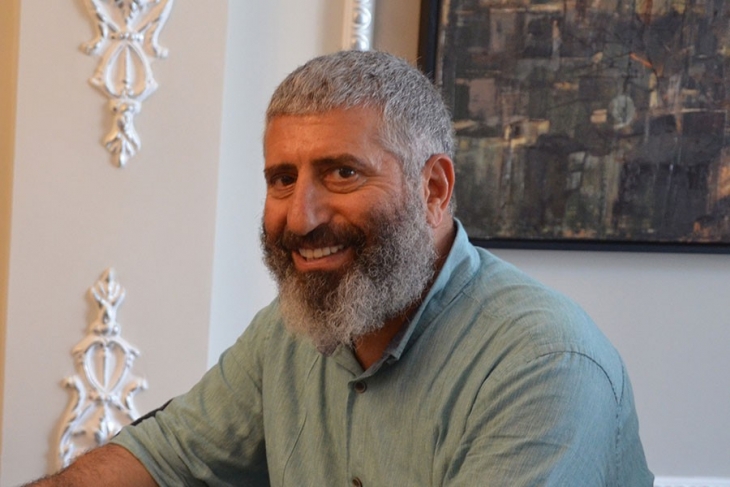 [/vc_column_text][/vc_column_inner][/vc_row_inner][/vc_column][/vc_row][vc_row][vc_column][vc_column_text]
[/vc_column_text][/vc_column_inner][/vc_row_inner][/vc_column][/vc_row][vc_row][vc_column][vc_column_text]
يستيقظ عادة اسحق كاراكش ، رئيس تحرير صحيفة “هالكين نابزي” الأسبوعية في إسطنبول، باكرا في الصباح. وهو عادة ما ينهض قبل الفجر ويمشي لمسافة طويلة مع مجموعة من الأصدقاء في الحي ، قبل أن يعود بحلول الساعة الثامنة صباحا. عند هذا الوقت، يبدأ في قراءة أخبار اليوم وهو يتناول وجبة الإفطار يونشر تغريدات انفعالية عن أخبار الصباح.
في ٢٠ يناير / كانون الثاني ، شن الجيش التركي عملية واسعة في منطقة عفرين التي يسيطر عليها الأكراد في سوريا ، بذريعة أن القوات الكردية في المنطقة هي امتداد لحزب العمال الكردستاني ، الذي تصنّفه تركيا كمنظمة إرهابية. كاراكش، مثل كثيرين آخرين على تويتر، أطلق انتقادات ضد التوغل العسكري التركي، وقد فعل ذلك باستخدام حسابishakkakarakas ، الذي أغلقه منذ ذلك الحين ابنه ومحاميه أوكور كاراكش.
تساءل يومها كركاش متوجها الى السياسيين في تركيا: “لا توجد عصابة واحدة تابعة لتنظيم الدولة الإسلامية في عفرين. لماذا تنشرون هذه الأكاذيب؟”. كان قادة البلاد قد زعموا أن القوات الكردية في سوريا هم في الواقع من مقاتلي داعش. كما كتب كركاش: “لا تصدقوا دعاية التلفزيون حول عفرين”، متوجها لزملائه المواطنين في تغريدة أخرى. كما أعاد تغريد منشورا يقول أن مدنيين قد قتلوا في المنطقة على يد الجيش التركي.
بعدها، أتت القوات الأمنية الى منزله. “كان الوقت حوالي منتصف الليل. كان أبي نائمًا ولم أكن في المنزل ، لكن والدتي كانت هناك. جاء ضباط الشرطة وقرعوا على الباب. وقالوا أنه لديهم مذكرة تفتيش”، يقول أوكور كاراكش وهو محامي دفاع مقره في اسطنبول. تم القبض على والده في ٢٦ يناير بتهمة “نشر دعاية إرهابية” عبر تويتر. وهو يقبع الآن في سجن “سيليفري” ، ولم يصدر قرار ظني بحقّه بعد.
بلد بلا روح للدعابة
بالتأكيد لم يكن كاراكش الوحيد الذي شعر بغضب الدولة التركية وهي في حالة حرب. طبقاً لوزارة الداخلية التركية ، حتى ٢٧ فبراير / شباط ، احتجزت الشرطة ٨٤٥ شخصاً بسبب انتقادهم للعمليات العسكرية في عفرين (أو “نشر دعاية منظمة إرهابية” بحسب تعبير الوزارة المفضّل) والتي أطلق عليها رسمياً “عملية غصن الزيتون”. لم تفصح الوزارة عن عدد المعتقلين الذين تم توجيه تهم إليهم رسمياً وسجنهم ، ولكن استناداً الى أن جميع الأشخاص الثمانية الذين تم احتجازهم مع كركاش كانوا ، وفقاً لوثائق المحكمة ، قد اعتقلوا ، فان هذا الرقم لن يكون منخفضًا على الأرجح.
ولد كاراكش في ديار بكر في عام ١٩٦٠. وقد أنهى دراسته الابتدائية ثم بدأ بالعمل كمساعد لسائقي الشاحنات في سن الثانية عشرة. وفي عام ١٩٨٩ اضطر إلى الهجرة إلى اسطنبول مثل العديد من الأكراد في ذلك الوقت ، مع زوجته موزيين وابنه البكر أوكور (أزاد). وولد أطفال الزوجان الآخران ، أوموت وأوفوك ، في المدينة.
“إنه شخص وطني ، وكان دائماً شخصاً ذو ميولاً سياسية” ، يقول عنه ابنه أوكور كاراكش. على الرغم من أنه كان في قطاع الخدمات اللوجستية إلى أن أفلست شركته في أعقاب الأزمة المالية في عام ٢٠٠٠ في تركيا ، كان كاراكش دائما منخرطا في السياسة وكتب أعمدة لصحيفة “أوزغور غوندم” المؤيدة للأكراد والصحيفة الاشتراكية “افرينسيل”.
الحياة في اسطنبول و هالكين نابزي
على الرغم من أنه عمل في التجارة بعد انتقاله إلى اسطنبول ، وجد كاراكش الوقت لإكمال تعليمه الثانوي من خلال التعلم عن بعد. ووفقاً لمحضر استجوابه ، فهو الآن يدرس السنة الثانية من اختصاص علم الاجتماع مع جامعة للتعليم عن بعد[1] في تركيا. كما حرص أن يتمتع أولاده بفرص أفضل في الحياة، فأحدهم محامٍ والآخر طبيب. أصغر أبناءه مسجل حاليا في برنامج جامعي اختصاص هندسة الكمبيوتر.
“حتى قبل أن يصبح صحفياً ، كان دائماً مهتماً بمشاكل البلد”، يقول أحمد تولجار ، الصحفي التركي المخضرم الذي كان ينشر صحيفة هالكين نابزي مع كاراكش لأكثر من ست سنوات. وكان الرجلان قد التقيا في عدة حلقات نفاش واجتماعات قبل أن يبدآن بالعمل سوية بشكل رسمي. عندما خرج كاراكش من قطاع الخدمات اللوجستية وترك تولجار وظيفته اليومية في صحيفة” بيرغون” في النصف الثاني من عام ٢٠٠٠ ، أنشأ الرجلان شركة إعلانات في منطقة مالتيبي في اسطنبول – حيث يتم نشر صحيفة “هالكين نابزي” اليوم.
“إنه رب عائلة. كان يأتي الى العمل بعد مشيته الصباحية ويذهب إلى البيت مباشرة في المساء. في عام ٢٠١٣، قررنا نشر صحيفة محلية جديدة سوية ، وقررنا أنها لن تكون مثل تلك المنشورات المحلية التي تغطي أخبار ولائم رئيس البلدية أو آخر أخبار المتنفذّين في المجتمع “، يقول تولجار.
وهكذا ولدت صحيفة “هالكين نابزي”. بدأ توزيع الصحيفة الأسبوعية على الجانب الأناضولي من اسطنبول بتمويل من الشركات المحلية والبلديات ، وكانت تطبع حوالي ١٠٠٠٠ نسخة. بالنظر إلى رؤية وخلفية مؤسسيها ، فإن تركيز “هالكين نابزي” على الصحافة الرصينة ليس مستغرباً: فالصحيفة تولي استقلالها أهمية قصوى قبل أي شيء آخر، وتقوم بتغطية الشؤون المحلية مع الحفاظ على صلتها بالمواضيع ذات الأهمية الوطنية. وفقاً لتولغار ، فإن سياسة التحرير في هالكين نابزي تُعرَّف بـ “صحافة السلام التي تشمل جميع شرائح المجتمع والتي تستخدم أسلوباً يمكن فهمه من قبل جميع الشرائح الاجتماعية”. لكنه يضيف بسرعة: “تغريدات اسحق لا تعكس سياستنا التحريرية بالطبع “.
رب العائلة
يقول تولجار:”ناهيك عن عدم وضع هذا الرجل في السجن ، يجب عليهم أن يكافئوه لأنه وجد صيغة للسلام في هذا البلد”، ويضيف أن المشاركين في جلسات الصباح مع كاراكش (تولجار ، الذي يسعده النوم في الصباح، ليس واحدا منهم) يأتون من خلفيات سياسية شديدة التنوع وحتى التباين.
يضيف: “إنه رجل سلام. أعتقد أنك تستطيع أن تقول ذلك عن أي شخص ، لكنه أراد أن يكون جندي للسلام. لسوء الحظ، لقد وضعوا هذا الرجل في السجن”. كما يشتكي مازحا أنه اضطر هو وأوكور لتناول الوجبات السريعة في الأسابيع القليلة الماضية. “كان دائما يحضّر الغداء لنا في المكتب. في بعض الأحيان ، يسأل الناس في المبنى عما إذا كان بإمكانهم الحصول على بعض ما يطبخه إذا لم يجدوا شيئًا جيدًا للطلب في يوم معين. “
لكن بالنسبة إلى تولجار ، فإن غياب كاراكش يعني أكثر من مجرد فقدان وجبة غداء صحية وشهية. عندما أنشأ الاثنان الصحيفة، كانا خلال العامين الأولين في الغالب بمفردهما. “لقد عملنا معا لفترة طويلة ، وبالطبع هذا أمر صعب” ، كما يقول، بقليل من المرارة والعتاب على صديقه لتغريده “بشكل غير مسؤول”.
ما لا يقوله تولجار هو كيف شارك هو وصديقه المسجون الآن الضغط اليومي الناتج عن اطلاق وادارة صحيفة بمفردهما وكيف كان يجب عليهما أن يتصديا للهموم التي تصاحب محاولة إنتاج صحافة رصينة في واحدة من أخطر البلدان لمهنة الصحافة. خاض الرجلان المعركة معا ، واليوم، فان واحد منهما يقبع في السجن.
وحتى إذا أُدين كاراكش ، سيتم إطلاق سراحه في نهاية المطاف لأنه على الرغم من أن تهمة الدعاية يعاقب عليها بالسجن لمدة سنتين، فإن هذه الأحكام عادة ما يتم تعليقها بموجب الإجراءات الجنائية في تركيا ، وفقاً لأوكور كاراكش.
يضيف تولجار “لديه عائلة ضخمة. إنه جد ولديه حفيد آخر على الطريق. وسوف يتزوج أوكور هذا الصيف.”
في السياق التركي الأوسع، حيث يقبع ١٥٣ صحفي في السجن، ٦ منهم حكم عليهم بالسجن مدى الحياة دون إمكانية الإفراج المشروط قبل أسبوعين فقط ، فإن امكانية الإفراج عن كاراكش في أول جلسة محاكمة له هو مدعاة لبعض الاطمئنان.
يتريّث تولجار قبل أن يقول بهدوء: “موراد سابونشو من صحيفة جمهورييت ، وهو جوهرة ، أحمد شيخ ، الصحافي العظيم الذي لم يطارد أبدا المصالح الشخصية أو الشهرة ، وأكين أتالاي، هم كلهم في السجن اليوم. عثمان كافالا أيضا يقبع في السجن. هناك الكثير من الأشخاص العظماء في السجن ، فمن المحرج أن أشكو “ياه، صديقي صار له في السجن شهر ونصف.”
[/vc_column_text][/vc_column][/vc_row][vc_row][vc_column width=”1/4″][/vc_column][vc_column width=”3/4″][/vc_column][/vc_row]
05 Mar 18 | Index in the Press
Index on Censorship is bidding to raise £15,000 by the end of this month to map attacks against freedom of expression and demand governments do more to stop them. The plea follows the death of journalist Jan Kuciak, and his partner Martina Kušnírová, who had been investigating the Italian mafia in Slovakia. Read the full article
05 Mar 18 | News and features, Turkey, Turkey Uncensored
[vc_row][vc_column][vc_column_text]

İshak Karakas (Photo: Ahmet Tulgar)
İshak Karakaş, the editor-in-chief of a local Istanbul weekly Halkın Nabzı, is an early riser. He is usually up before dawn and back from a long walk, which he takes with an unlikely group of friends from the neighbourhood, by 8 am. This is when he starts checking the news of the day over breakfast while posting impassioned tweets about the morning’s reports.
On 20 January the Turkish military launched an operation into Afrin, a Kurdish-controlled enclave in Syria, arguing that the Kurdish forces in the region are an extension of the Kurdistan Workers’ Party, which Turkey considers a terrorist organisation. Karakaş, like many others, took to Twitter to criticise the military incursion. He did so using the account @ishakkakarakas_, which has since been closed by his son and lawyer Uğur Karakaş.
“There is not a single Islamic State gang in Afrin. Why are you telling lies?” he asked Turkey’s politicians, who have claimed that the Kurdish forces in Syria are actually ISIS militants. “Don’t believe the TV’s propaganda on Afrin,” he told fellow citizens in another tweet. He also retweeted a post claiming that civilians had been killed in the region at the hands of the Turkish military.
Then they came for him.
“It was about midnight. My dad was sleeping. I wasn’t home, though my mother was. The police came banging on the door; they said they had a search warrant,” says Karakaş, an Istanbul-based defence attorney. His father was arrested on 26 January on charges of “spreading terror propaganda” through Twitter. He is now in Silivri Prison, with no indictment in sight.
A country with no humour
Karakaş certainly wasn’t the only one to feel the ire of the Turkish state at war. According to the Turkish interior ministry, as of 27 February, 845 people had been detained by police for criticising the Afrin operation (or “spreading propaganda of a terror organisation” as the ministry prefers to phrase it) which Turkey has officially named “Operation Olive Branch”. The ministry hasn’t said how many of those detained were formally charged and imprisoned, but judging by the fact that all eight taken along with Karakaş were, according to his court papers, arrested, that number is not likely to be low.
Karakaş was born in Diyarbakır in 1960. He finished primary school and then started working as an assistant to truck drivers at the age of 12. In 1989 he was forced to migrate to Istanbul like many other Kurds at the time, together with his wife Müzeyyen and first-born, Uğur (Azad). The couple’s other children, Umut and Ufuk, were born in the city. “He is a patriot, and he was always a political person,” remembers Uğur Karakaş. Although he was in the logistics trade until his company went bankrupt following the 2000 financial crisis in Turkey, Karakaş was always engaged in politics and he wrote columns for the pro-Kurdish Özgür Gündem and socialist Evrensel.
Life in Istanbul and Halkın Nabzı
Despite being in commerce after he moved to Istanbul, he found the time to complete secondary and high school through distance learning. According to his interrogation log, he is currently in his second year obtaining a sociology degree from Turkey’s distance learning university Açıköğretim. He also made sure that his children had a better chance at life: one is a lawyer and the one is a doctor. His youngest is attending an undergraduate computer engineering programme.
“Even before he was a journalist, he was always interested in the country’s problems,” says Ahmet Tulgar, a veteran Turkish journalist who has been publishing Halkın Nabzı with Karakaş for more than six years. Their paths had crossed at panels and meetings before they formally started working together. When Karakaş was out of the logistics business and Tulgar left his day job at the BirGün newspaper in the second half of 2000s, the two men started an advertising company in İstanbul’s Maltepe district — which is where Halkın Nabzı is published today.
“He is a family man. He would come to work after his morning walk and go home straight in the evening. In 2013 we decided to publish a local newspaper together, but it wouldn’t be one of those local publications which only report on where the mayor had dinner or on the recent affairs of the powerful people in the community,” Tulgar says.
And as such, Halkın Nabzı came to life. Distributed on the Anatolian side of Istanbul and funded by local businesses and municipalities, the weekly newspaper has a circulation of 10,000 copies. Given the vision and background of its founders, Halkın Nabzı’s emphasis on quality journalism is not a surprise: the paper values its independence above all else. It brings local stories to the forefront while maintaining its relevance to the national conversation. According to Tulgar, Halkın Nabzı’s editorial policy is defined by a “peace journalism that encompasses all segments of society and that uses a style which can be comprehended by all societal segments”. “İshak’s tweets are not reflective of our editorial policy of course,” he is quick to add.
A family man
“Let alone putting such a man in jail, they should reward him for having found the formula for peace in this country,” says Tulgar, who adds that the participants of Karakaş’s morning (Tulgar, who is happy to sleep in in the morning, isn’t one of them), come from very diverse and opposing political backgrounds.
“He is a man of peace. I guess you can say that about anyone, but he wanted to be a soldier of peace. Unfortunately, they have put such a man in jail,” Tulgar says. He also jokingly complains that he and Uğur have had to eat fast food for the past few weeks. “He always fixed lunch for us in the office. Sometimes the people in our building would come ask if they could have some of what he has cook if they couldn’t find something good to order on a particular day.”
For Tulgar, Karakaş’s absence is much more than missing a hearty and healthy lunch. When the two started the newspaper, they were mostly on their own for the first couple of years. “We have worked together for so long, of course it is hard,” he says, slightly bitter at his friend for tweeting “irresponsibly”.
What Tulgar doesn’t say is how he and his now-imprisoned friend have shared the everyday stress of launching a publication and how they had to brave the anxiety of trying to produce good journalism in one of the most dangerous countries for the profession. The two men have been in battle together, and now one is in prison.
Even if Karakaş is convicted, he would be released because although propaganda is punishable by a two-year sentence, such sentences are usually suspended under Turkey’s criminal procedures, according to Uğur Karakaş.
“He has a huge family. He is a grandfather and another grandchild is on the way. Uğur will get married this summer,” Tulgar added.
In Turkey’s wider reality, where 153 journalists are in prison and six were sentenced to life in prison without the possibility of parole only two weeks ago, knowing that Karakaş may be released at his first trial is comforting.
Tulgar slows down, speaking softly: “Cumhuriyet’s Murat Sabuncu, who is a gem of a man, Ahmet Şık, who is such a great journalist who has never chased personal interest or fame, and Akın Atalay are in prison. Osman Kavala is also in prison. There are so many great people in prison, it is embarrassing to complain ‘oh my friend has been in prison for one-and-a-half months.’ ”[/vc_column_text][/vc_column][/vc_row][vc_row][vc_column][vc_basic_grid post_type=”post” max_items=”12″ style=”pagination” items_per_page=”2″ element_width=”6″ grid_id=”vc_gid:1520255755875-dae306ff-b8c0-4″ taxonomies=”8607″][/vc_column][/vc_row][vc_row][vc_column][vc_custom_heading text=”Mapping Media Freedom” use_theme_fonts=”yes”][vc_separator color=”black”][vc_row_inner][vc_column_inner width=”1/4″][vc_icon icon_fontawesome=”fa fa-times-circle” color=”black” background_style=”rounded” size=”xl” align=”right”][/vc_column_inner][vc_column_inner width=”3/4″][vc_column_text]
Since 24 May 2014, Mapping Media Freedom’s team of correspondents and partners have recorded and verified 3,597 violations against journalists and media outlets.
Index campaigns to protect journalists and media freedom. You can help us by submitting reports to Mapping Media Freedom.[/vc_column_text][/vc_column_inner][/vc_row_inner][vc_separator color=”black”][/vc_column][/vc_row][vc_row][vc_column][vc_custom_heading text=”Don’t lose your voice. Stay informed.” use_theme_fonts=”yes”][vc_separator color=”black”][vc_row_inner][vc_column_inner width=”1/2″][vc_column_text]Index on Censorship is a nonprofit that campaigns for and defends free expression worldwide. We publish work by censored writers and artists, promote debate, and monitor threats to free speech. We believe that everyone should be free to express themselves without fear of harm or persecution – no matter what their views.
Join our mailing list (or follow us on Twitter or Facebook) and we’ll send you our weekly newsletter about our activities defending free speech. We won’t share your personal information with anyone outside Index.[/vc_column_text][/vc_column_inner][vc_column_inner width=”1/2″][gravityform id=”20″ title=”false” description=”false” ajax=”false”][/vc_column_inner][/vc_row_inner][vc_separator color=”black”][/vc_column][/vc_row]
05 Mar 18 | Media Freedom, media freedom featured, News and features, Press Releases
[vc_row][vc_column][vc_column_text]Index on Censorship has launched a campaign to raise £15,000 to help us document growing threats to media freedom.
Times columnist and Index chair David Aaronovitch kicked off the campaign by writing to supporters following the murder in Slovakia of Jan Kuciak, a journalist investigating links between organised crime and politics: “This happened not in a war zone, not in a dictatorship, but in an EU member state.”
Aaronovitch said that when he became chair of Index on Censorship five years ago, he was naïve: “Back then I thought that, in the West at least, the idea of freedom of speech and expression was largely a fought and won battle.”
In the time that Aaronovitch has been chair of Index, media freedom around the world has come under increasing pressure, including in Europe and neighbouring states. In the past six months alone, journalists in Turkey have received life sentences just for doing their job. In Malta, journalist Daphne Caruana Galizia was murdered for exposing corruption. [/vc_column_text][/vc_column][/vc_row][vc_row][vc_column width=”1/4″][vc_icon icon_fontawesome=”fa fa-times” color=”black” background_style=”rounded” size=”xl” align=”right”][/vc_column][vc_column width=”3/4″][vc_column_text]
“I’ve realised how easily we can suggest that we’re for freedom of expression from one corner of our mouths, yet espouse limiting such expression from the other,” Aaronovitch wrote.
[/vc_column_text][/vc_column][/vc_row][vc_row][vc_column][vc_column_text]Despite this, there have been inspiring people fighting back even the face of difficult and dangerous circumstances, he added.
To continue to support media freedom in the challenging times ahead, Index needs your help.
A donation of £20 ensures a verified attack against media freedom is mapped publicly online; a gift of £100 enables an official report to pressure governments; a gift of £1000 supports extensive fieldwork to identify and confirm reported violations.
The goal is to raise at least £15,000 by the end of March to map attacks over the next six months and demand governments to do more to stop them.
You can read the full letter from David Aaronovitch here.[/vc_column_text][/vc_column][/vc_row]
05 Mar 18 | About Index
Last week, Jan Kuciak, a journalist investigating links between organised crime and politics, was shot dead – along with his fiancée. This happened not in a war zone, not in a dictatorship, but in Slovakia: an EU member state.
When I became chair of Index on Censorship five years ago, I was naïve.
Back then I thought that, in the West at least, the idea of freedom of speech and expression was largely a fought and won battle, and that internationally the Force was with us.
I’ve learned a lot in that half decade. I’ve seen great gains in countries such as Turkey thrown into sharp reverse, with life sentences for journalists just doing their job. I’ve seen not just the murder of Kuciak, but also the killing of an investigative journalist in Malta for exposing corruption. I’ve seen cartoonists gunned down in their office in a European capital city and then blamed for their own murders.
I’ve realised how easily we can suggest that we’re for freedom of expression from one corner of our mouths, yet espouse limiting such expression from the other.
But I’ve also witnessed the fight-back against such restrictive mentalities and outlooks. I’ve met the most inspiring people working in the most difficult and dangerous of circumstances, and been able to offer succour and resources.
I’ve been a small part of the argument for free speech and expression which Index never, ever stops making.
You can help make it too. To continue to do this effectively in the challenging times ahead, we need your help.
A donation of £20 ensures a verified attack against media freedom is mapped publicly online; a gift of £100 enables an official report to pressure governments; a gift of £1000 supports extensive fieldwork to identify and confirm reported violations.
Our goal is to raise at least £15,000 by the end of March to map attacks over the next six months and demand governments to do more to stop them.
I hope you will join me in supporting Index and your right to a free press. Please donate today.
Yours ever,
David Aaronovitch
03 Mar 18 | Index in the Press
About this time in 1973, 45 years ago that is, I published my first article in the second issue of an obviously unknown London-based magazine, Index on Censorship. It had been launched in November 1972, to publish banned, imprisoned, silenced writers and artists in Eastern Europe and beyond. Very much a Western instrument in the Cold War, but it went further than that. Read the full article
01 Mar 18 | Campaigns -- Featured, Statements
[vc_row][vc_column][vc_column_text]Index on Censorship welcomes the announcement by Secretary of State Matthew Hancock that the government will not implement Section 40 of the Crime and Courts Act 2013.
Implementing Section 40 would have meant that Index, which refuses to sign up to a state-backed regulator – and many other small publishers – could have faced crippling court costs in any dispute, whether they won or lost a case. This would have threatened investigative journalists publishing important public interest stories as well as those who challenge the powerful or the wealthy.
We have argued consistently that Section 40 is a direct threat to press freedom in the UK and must be scrapped. This part of the act, created as a response to the Leveson Inquiry into phone hacking, has been on the statute for several years but was not enacted because — until 2016 — there was no approved regulator of which publishers could be part. [/vc_column_text][/vc_column][/vc_row][vc_row][vc_column][vc_custom_heading text=”Don’t lose your voice. Stay informed.” use_theme_fonts=”yes”][vc_separator color=”black”][vc_row_inner][vc_column_inner width=”1/2″][vc_column_text]Index on Censorship is a nonprofit that campaigns for and defends free expression worldwide. We publish work by censored writers and artists, promote debate, and monitor threats to free speech. We believe that everyone should be free to express themselves without fear of harm or persecution – no matter what their views.
Join our mailing list (or follow us on Twitter or Facebook) and we’ll send you our weekly newsletter about our activities defending free speech. We won’t share your personal information with anyone outside Index.[/vc_column_text][/vc_column_inner][vc_column_inner width=”1/2″][gravityform id=”20″ title=”false” description=”false” ajax=”false”][/vc_column_inner][/vc_row_inner][vc_separator color=”black”][/vc_column][/vc_row][vc_row][vc_column][vc_basic_grid post_type=”post” max_items=”4″ element_width=”6″ grid_id=”vc_gid:1519906042363-4bc2dd22-cabf-7″ taxonomies=”6534″][/vc_column][/vc_row]
01 Mar 18 | China, News and features
With the historic announcement at the weekend that China would end the two-term limit on presidents, meaning the current leader Xi Jinping could be president for life, it created an online storm.
People took to the popular Chinese social media apps Weibo and WeChat to express either disdain and outrage. It didn’t take too long for the country’s well-oiled censorship apparatus to swing into action and ban all of the obvious terms related. Within hours, you couldn’t say “I don’t agree”, “migration”, “emigration”, “re-election”, “election term”, “constitution amendment”, “constitution rules”, “proclaiming oneself an emperor”, “Yuan Shikai (Former Emperor)” and “Winnie the Pooh” (more on this soon).
At the same time, Chinese citizens created and widely shared a series of memes. Most of these have since been removed, but not before enough people saw them, screenshots were taken and they were spread on media beyond the censor’s reach. Here’s an overview of some of the best:
King Winnie
The world’s favourite cuddly teddy bear, unless you’re a Chinese leader. After a meme likened the cartoon character with the Communist Party leader went viral in 2013, Winnie the Pooh became a popular meme when riffing Xi – and arguably the world’s most censored children’s book character. That has not stopped people persisting with the animated representation of the leader. In response to the new proposal, several of the following memes circulated:

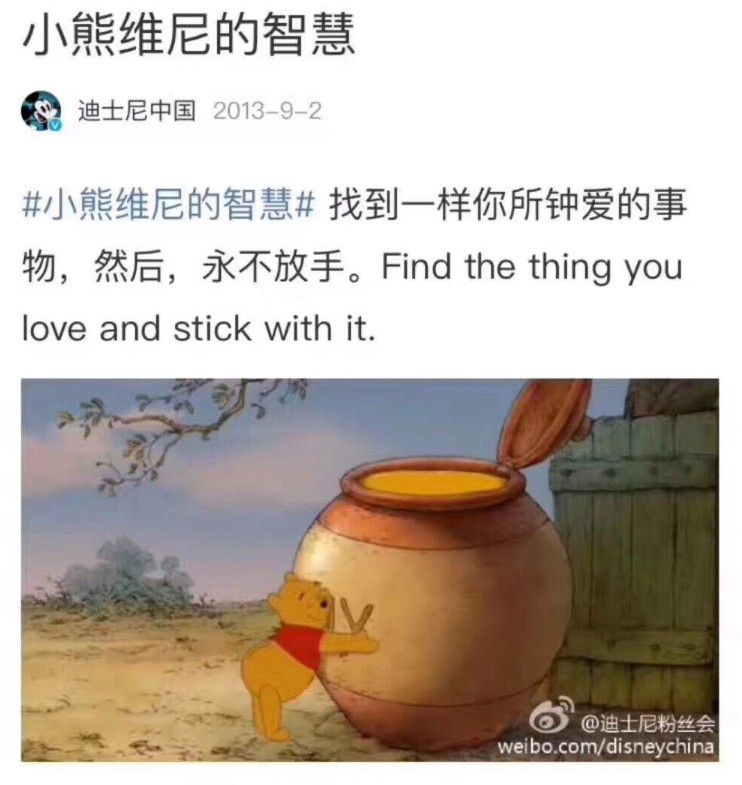


The original meme that prompted the government to ban Pooh in 2013.
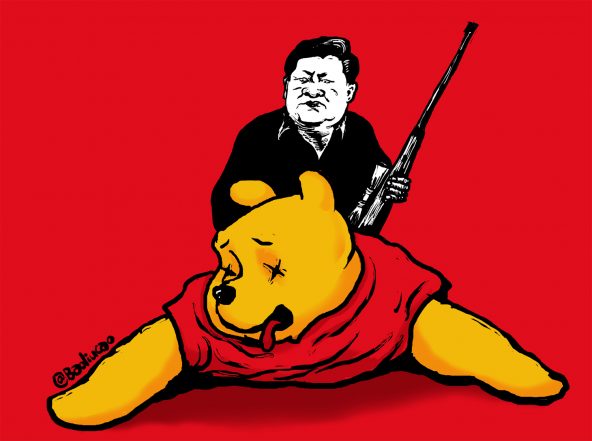
Another oldie but goodie expressing Xi’s disdain for Pooh, created by cartoonist Badiucao in the China Digital Times.
Emperor Xi
An obvious one here. Graphics emerged with references to past emperors of China, emphasizing the point that this new proposal is reminiscent of past Chinese rulers and dictators. Some of these graphics censored include:
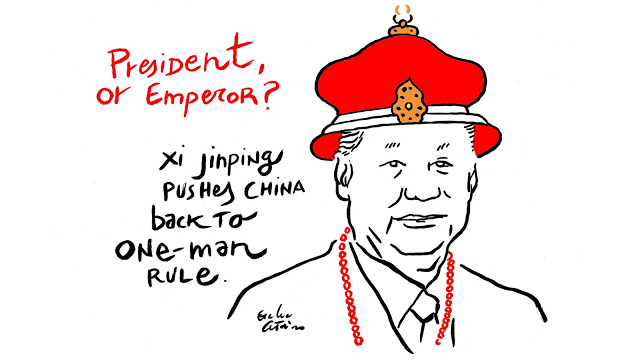
Cartoon created on political activism website, ChannelDraw.
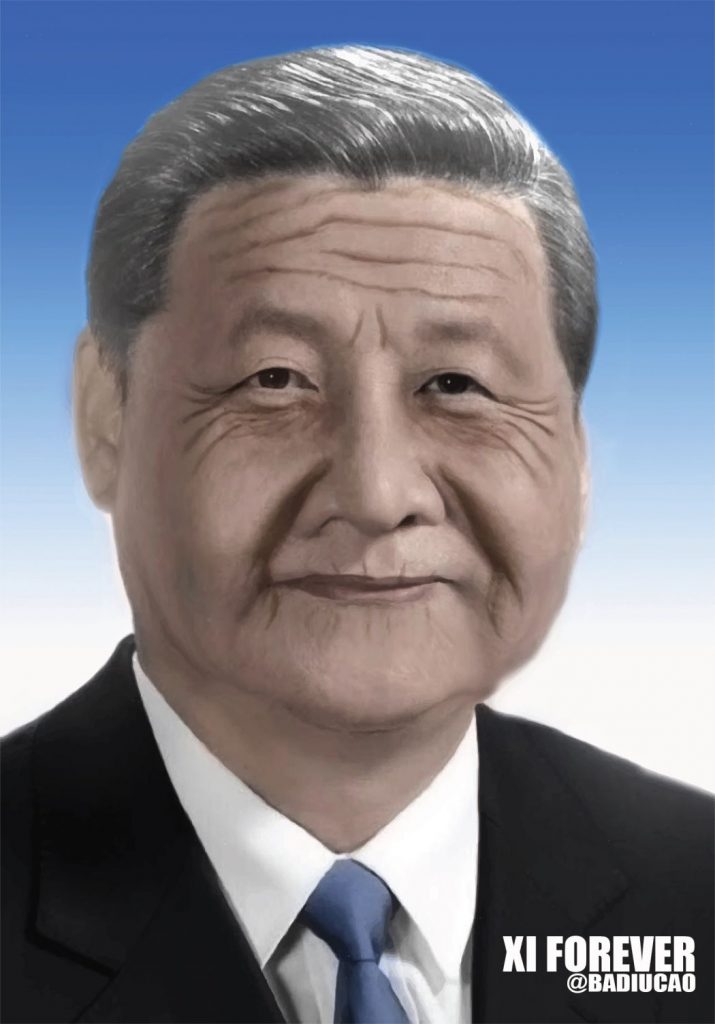
Graphic created after the announcement by Badiucao, prolific political activist and cartoonist.
Silver lining?
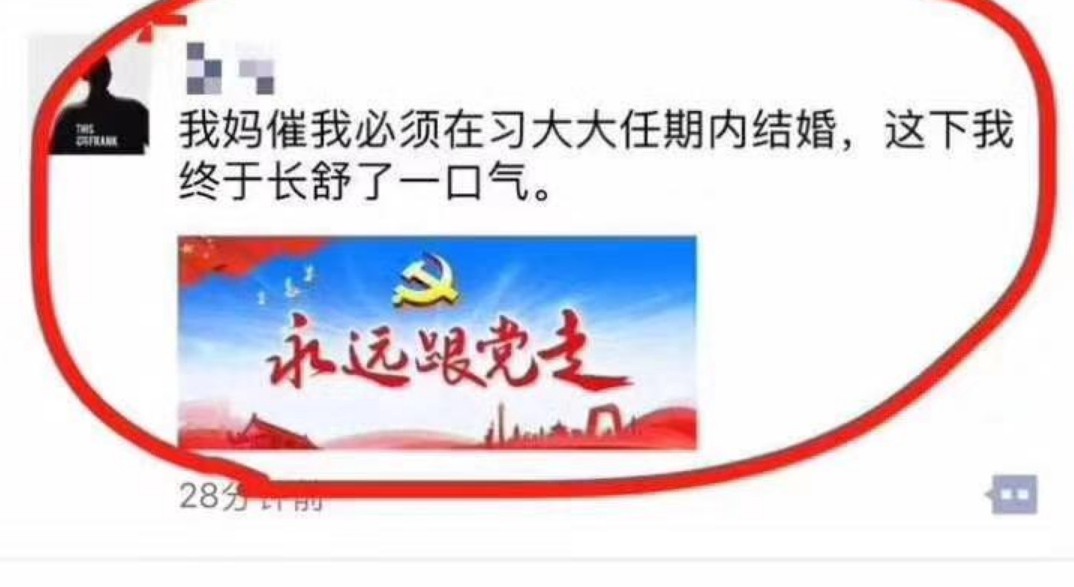
Perhaps the best of the memes, combining as it does a joke about Xi’s term extension and a joke about the common Chinese pressure to get married. It reads: “My mom said that I have to get married before Xi Dada’s term in office ends. Now I can breathe a long sigh of relief.”
Don’t forget the bunnies
While the latest news is sure to keep the censors busy for some time, they’ve been waging another war in China this year against #Metoo, which has recently come to the country and has not been well-received by a government uncomfortable with any form of protest (read our article on protest in China here). Initially the hashtag #woyeshi went viral, which literally means “me too”. When that was banned, people got creative. Introducing the rice bunny. Rice in Mandarin is mi and bunny tu, pronounced basically “me too”. Now China’s internet is awash with images of bunny and rice combos, that is until the censors catch up. Bunnies and Pooh bears – China’s internet might be censored, but it’s never boring.
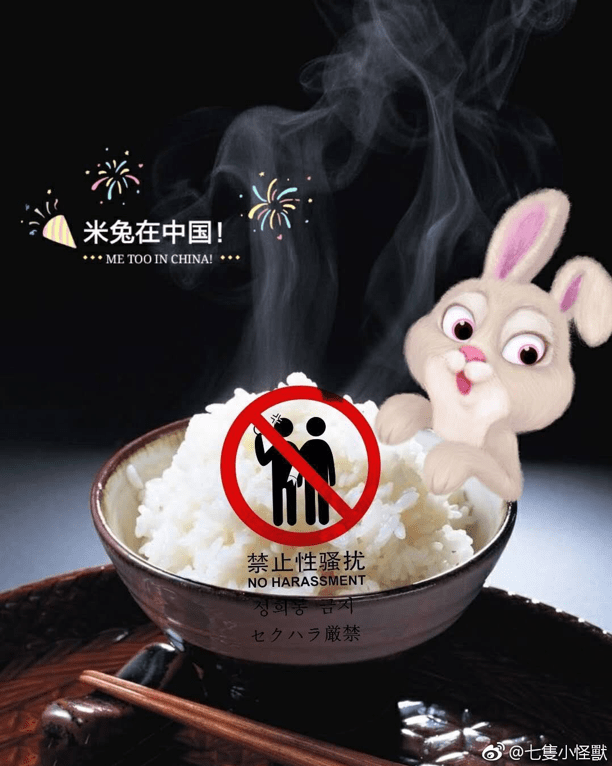
The Rice Bunny is against sexual harassment. Image from @七隻小怪獸 on Weibo





 [/vc_column_text][/vc_column_inner][/vc_row_inner][/vc_column][/vc_row][vc_row][vc_column][vc_column_text]
[/vc_column_text][/vc_column_inner][/vc_row_inner][/vc_column][/vc_row][vc_row][vc_column][vc_column_text]







